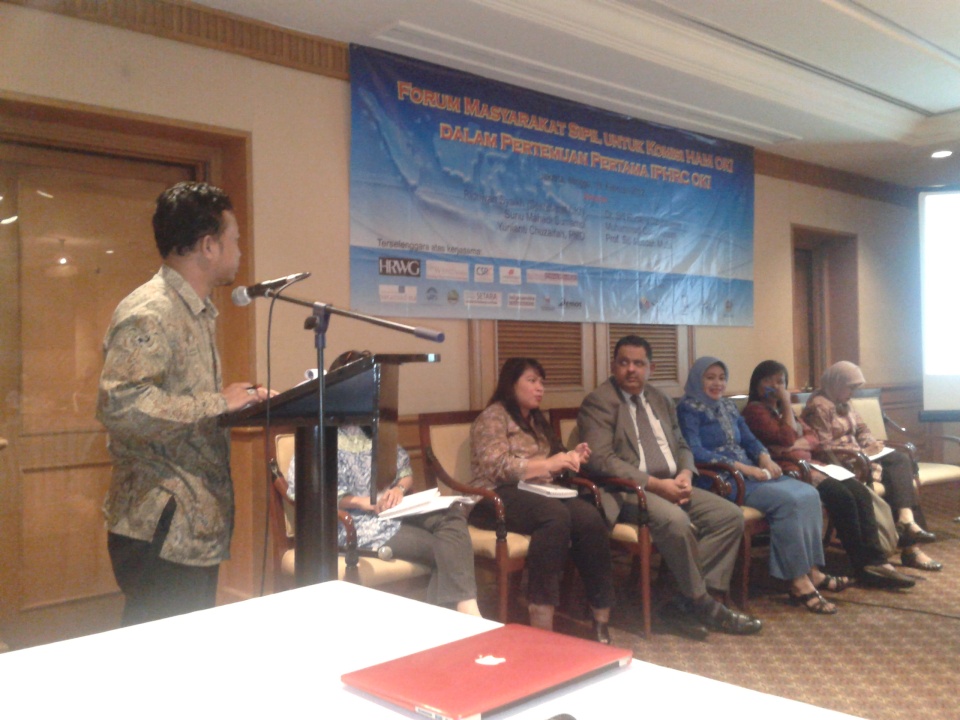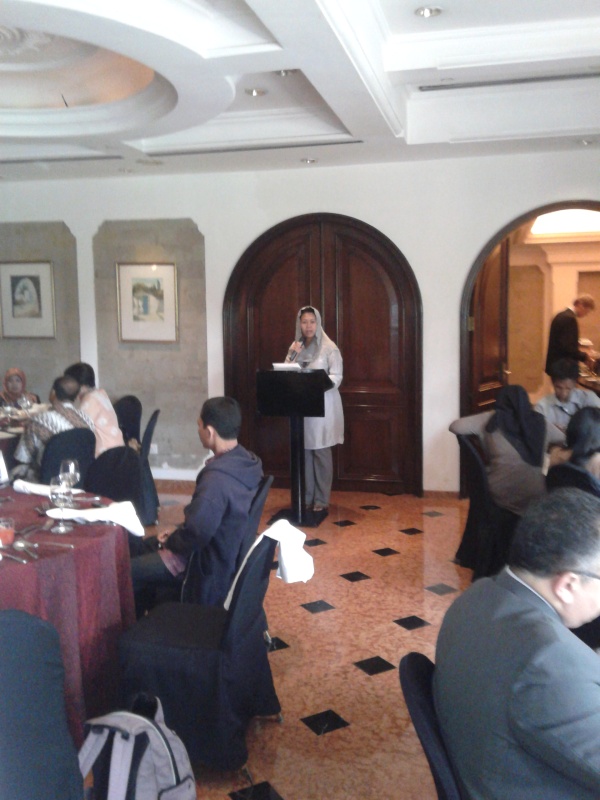Human Rights Council
Nineteenth session (Agenda item 9)
Racism, racial discrimination, xenophobia and related form of intolerance, follow-up and implementation of the Durban Declaration and Programme of Action
19/… Combating intolerance, negative stereotyping and stigmatization of, and discrimination, incitement to violence and violence against, persons based on religion or belief
The Human Rights Council,
Reaffirming the commitment made by all States under the Charter of the United Nations to promote and encourage universal respect for and observance of all human rights and fundamental freedoms without distinction as to, inter alia, religion or belief,
Reaffirming also Human Rights Council resolution 16/18 of 24 March 2011 and General Assembly resolution 66/167 of 19 December 2011,
Welcoming the panel discussion on strengthened international efforts to foster a global dialogue for the promotion of a culture of tolerance and peace at all levels, based on respect for human rights and diversity of religions and beliefs, held during the seventeenth session of the Human Rights Council pursuant to paragraph 9 of resolution 16/18,
Reaffirming the obligation of States to prohibit discrimination on the basis of religion or belief and to implement measures to guarantee the equal and effective protection of the law,
Reaffirming also that the International Covenant on Civil and Political Rights provides, inter alia, that everyone shall have the right to freedom of thought, conscience and religion or belief, which shall include freedom to have or to adopt a religion or belief of his choice, and freedom, either individually or in community with others and in public or private, to manifest his religion or belief in worship, observance, practice and teaching,
Reaffirming further the positive role that the exercise of the right to freedom of opinion and expression and the full respect for the freedom to seek, receive and impart information can play in strengthening democracy and combating religious intolerance,
Deeply concerned about incidents of intolerance, discrimination and violence against persons based on their religion or belief in all regions of the world,
Deploring any advocacy of discrimination or violence on the basis of religion or belief,
Strongly deploring all acts of violence against persons on the basis of their religion or belief, as well as any such acts directed against their homes, businesses, properties, schools, cultural centres or places of worship,
Concerned about actions that wilfully exploit tensions or target individuals on the basis of their religion or belief,
Noting with deep concern the instances of intolerance, discrimination and acts of violence in many parts of the world, including cases motivated by discrimination against persons belonging to religious minorities, in addition to the negative projection of the followers of religions and the enforcement of measures that specifically discriminate against persons on the basis of religion or belief,
Recognizing the valuable contribution of people of all religions or beliefs to humanity and the contribution that dialogue among religious groups can make towards an improved awareness and understanding of the common values shared by all humankind,
Recognizing also that working together to enhance implementation of existing legal regimes that protect individuals against discrimination and hate crimes, increase interfaith and intercultural efforts, and to expand human rights education are important first steps in combating incidents of intolerance, discrimination and violence against individuals on the basis of religion or belief,
1. Expresses deep concern at the continued serious instances of derogatory stereotyping, negative profiling and stigmatization of persons based on their religion or belief, as well as programmes and agendas pursued by extremist organizations and groups aimed at creating and perpetuating negative stereotypes about religious groups, in particular when condoned by Governments;
2. Expresses its concern that incidents of religious intolerance, discrimination and related violence, as well as of negative stereotyping of individuals on the basis of religion or belief, continue to rise around the world, and condemns, in this context, any advocacy of religious hatred against individuals that constitutes incitement to discrimination, hostility or violence, and urges States to take effective measures, as set forth in the present resolution, consistent with their obligations under international human rights law, to address and combat such incidents;
3. Condemns any advocacy of religious hatred that constitutes incitement to discrimination, hostility or violence, whether it involves the use of print, audio-visual or electronic media or any other means;
4. Recognizes that the open public debate of ideas, as well as interfaith and intercultural dialogue, at the local, national and international levels can be among the best protections against religious intolerance and can play a positive role in strengthening democracy and combating religious hatred, and convinced that a continuing dialogue on these issues can help overcome existing misperceptions;
5. Notes the speech given by Secretary-General of the Organization of the Islamic Conference at the fifteenth session of the Human Rights Council, and draws on his call on States to take the following actions to foster a domestic environment of religious tolerance, peace and respect, by:
(a) Encouraging the creation of collaborative networks to build mutual understanding, promoting dialogue and inspiring constructive action towards shared policy goals and the pursuit of tangible outcomes, such as servicing projects in the fields of education, health, conflict prevention, employment, integration and media education;
(b) Creating an appropriate mechanism within Governments to, inter alia, identify and address potential areas of tension between members of different religious communities, and assisting with conflict prevention and mediation;
(c) Encouraging training of Government officials in effective outreach strategies;
(d) Encouraging the efforts of leaders to discuss within their communities the causes of discrimination, and evolving strategies to counter these causes;
(e) Speaking out against intolerance, including advocacy of religious hatred that constitutes incitement to discrimination, hostility or violence;
(f) Adopting measures to criminalize incitement to imminent violence based on religion or belief;
(g) Understanding the need to combat denigration and negative religious stereotyping of persons, as well as incitement to religious hatred, by strategizing and harmonizing actions at the local, national, regional and international levels through, inter alia, education and awareness-building;
(h) Recognizing that the open, constructive and respectful debate of ideas, as well as interfaith and intercultural dialogue at the local, national and international levels, can play a positive role in combating religious hatred, incitement and violence;
6. Calls upon all States:
(a) To take effective measures to ensure that public functionaries in the conduct of their public duties do not discriminate against an individual on the basis of religion or belief;
(b) To foster religious freedom and pluralism by promoting the ability of members of all religious communities to manifest their religion, and to contribute openly and on an equal footing to society;
(c) To encourage the representation and meaningful participation of individuals, irrespective of their religion, in all sectors of society;
(d) To make a strong effort to counter religious profiling, which is understood to be the invidious use of religion as a criterion in conducting questionings, searches and other law enforcement investigative procedures;
7. Encourages States to consider providing updates on efforts made in this regard as part of ongoing reporting to the Office of the United Nations High Commissioner for Human Rights;
8. Calls upon States to adopt measures and policies to promote the full respect for and protection of places of worship and religious sites, cemeteries and shrines, and to take measures in cases where they are vulnerable to vandalism or destruction;
9. Calls for strengthened international efforts to foster a global dialogue for the promotion of a culture of tolerance and peace at all levels, based on respect for human rights and diversity of religions and beliefs.
|
Distr. by UN HRC Extranet / Original: English/ 16 March 2012
|











